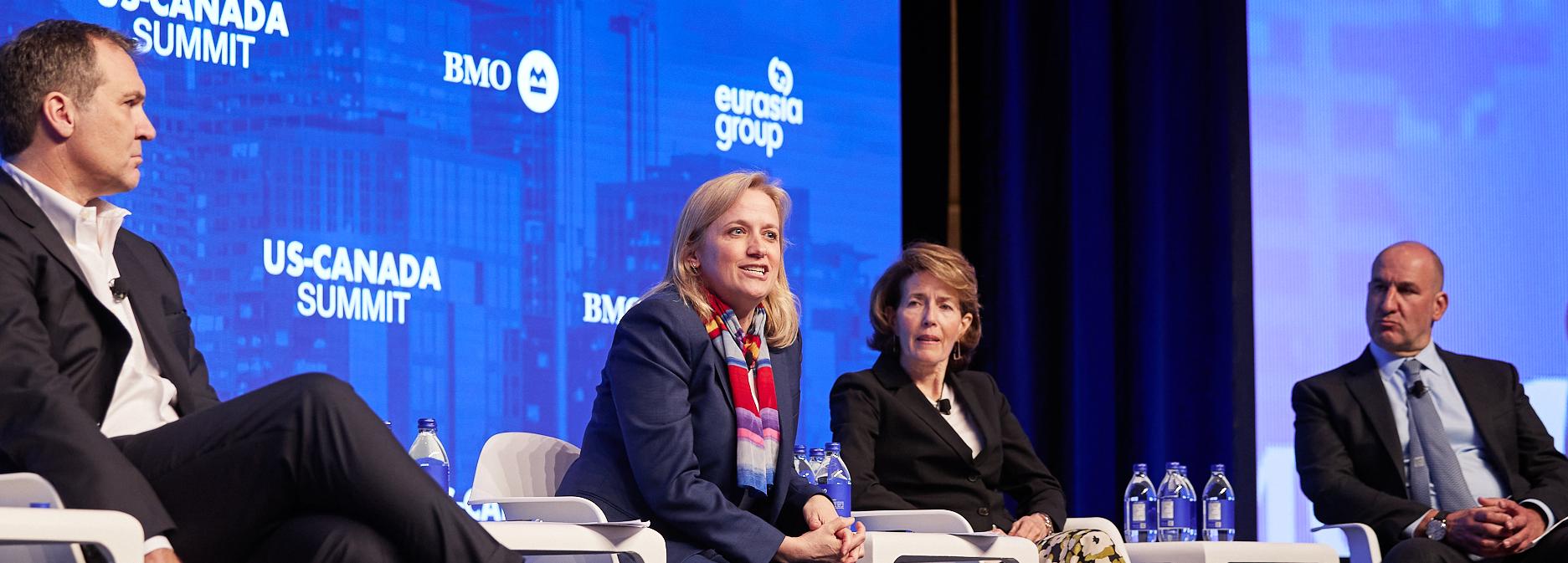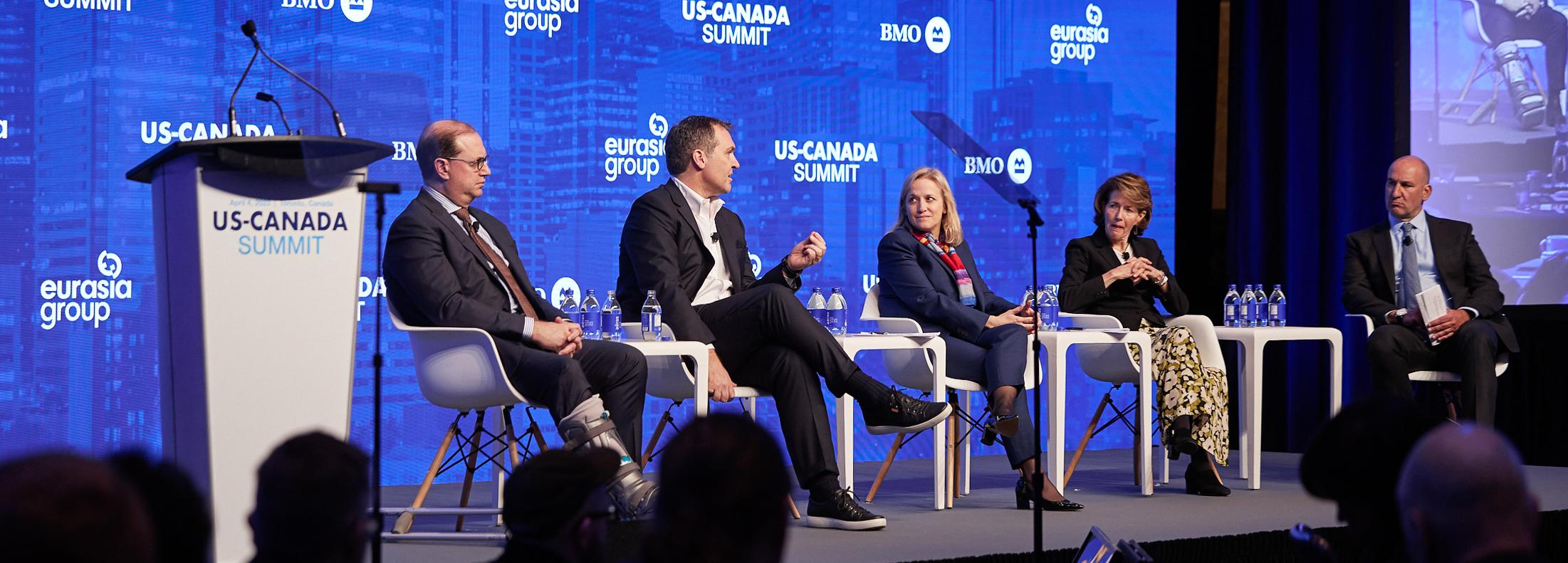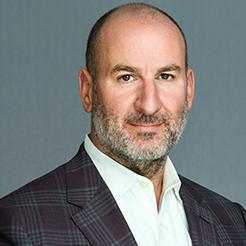
Global Markets Undergoing a Fundamental Shift – US-Canada Summit
-
bookmark
-
print
When terms like ‘never before’ are used to describe markets, it can come across as hyperbole. But hear it from some of the most senior voices at firms that collectively oversee more than $1.28 trillion in assets, and you may want to take notice.
According to the Market Opportunities in Focus: Setting the Agenda for Investors panel at the US-Canada Summit hosted by BMO and the Eurasia Group, the tumultuous period investors have endured in recent years has caused a fundamental shift in the market.
“Now is by far the most complex time I’ve seen, far more complex than the global financial crisis, because everything is different,” said Mark Wiseman, chairperson for the Alberta Investment Management Corporation (AIMCo). With the past few years featuring a pandemic, a liquidity bubble that pummelled riskier assets, a global fight against inflation and increasing geopolitical risks not seen since the Second World War, there is no shortage of reasons for the shift.
“It’s enough to keep your head spinning,” said Alan Tannenbaum to kick off the panel. To make sense of the ever-evolving market dynamics, Tannenbaum, Head, Global Investment & Corporate Banking, was joined by an esteemed panel consisting of AIMCo’s Mark Wiseman, Richard Falkenrath, Head of Geopolitics with Bridgewater Associates, Alison Loat, Managing Director, Sustainable Investing and Innovation at OPTrust and Carol Geremia, President and Head of Global Distribution for MFS Investment Management.
Geopolitics Weighing on Fundamentals
Over the last two and half decades, Wiseman said there has been a fundamental change to risk-return dynamics. On the risk side, investors have received a reminder that geopolitics matter.
Whether it’s the war in Ukraine, tensions between China and the West or the impact those events are having on the Middle East and the commodities markets, Wiseman explained that asset managers can’t do their jobs without understanding the geo-implications of their investments. “Never before, at least in my investment career, have geopolitics mattered to outcomes as much as they do today,” he noted.
The rate environment, driven by persistently high inflation, is having a similarly profound impact on returns, he explained. “We are seeing major moves that are going to continue in terms of the risk-free cost of capital, and that has implications all the way through the system,” he said. “When you change the risk-free rate, every single asset ultimately reprices, and capital allocation moves. It changes the way investors are going to allocate capital, it changes where you’re going to find return, and it changes the risks, both perceived and real.”
Historical Trends No Longer Guide
As much as investors like to look to past trends to understand markets, both Bridgewater’s Richard Falkenrath and OPTrust’s Alison Loat said this may not be one of those times. After going through an extended period of extraordinary global peace, the world now faces climate change risk and emerging geopolitical risks from Russia and China.
“The world is slowly reorganizing and reshaping and shifting to a containment model which is far more complicated than it was during the Cold War, because of the hyper attack on economies and societies as well as the velocity of markets and technologies,” Falkenrath said.
Those risks are making it more challenging to diversify globally. “For those of you who know me and know my intention for globalism, I wish the world was more global today,” he noted. “I wish we didn’t have the geopolitical issues that we have. I wish I could diversify my portfolio more easily globally.”
Climate change adds an entirely new wrinkle to what is already a complex market. As Loat explained, it’s impossible to fully understand the implications of climate change because no one has lived through that experience. Yet, she added, investors need to take notice because it will affect every single industry and geography. It means tactically going through each investment and strategy to assess the physical risks, she said.
Shifting Mindsets to Manage Climate Risk
The challenge is that the tools to fight climate risk are imperfect and untried. “It’s very uncomfortable for investors,” noted Loat. “We have to shift our mindset from something somebody else paid for to something that’s actually very critical and fundamental.”
MFS’s Carol Geremia said that what’s important to remember about ESG is that it’s not political. “This is what we need to educate our clients about,” she said. “This is about how to finance the future for our clients.” In this environment, the biggest threat she sees is short-termism, which will deter companies from taking material steps to tackle environmental issues that will benefit investors over the long term.
From an asset allocation perspective, investors today have had to take five times the amount of risk to get the same amount of return as they did 30 years ago, noted Geremia. Given the level of risk involved, she said it’s imperative that asset allocators are actively engaged with the companies they own.
For Geremia, asset managers need to redefine what long-term active management should be about. “We absolutely need to understand the businesses we are investing in,” she said. “We need to commit capital longer to these underlying businesses, and we need to engage way beyond proxy voting.”
Opportunities Close to Home
Given the concern around geopolitical risks, Wiseman made a strong case for investing closer to home. “The time is now for the North American market,” he said, noting a list of competitive advantages, such as energy self-sufficiency, access to natural resources, including those critical to the energy transition, and a solid regulatory environment.
“Those comparative advantages are on both sides of the border, but they’ll only be fully realized if the two countries work together in the single market,” he said.

Captured in photo (L-R): Richard Falkenrath, Head of Geopolitics with Bridgewater Associates; Alison Loat, Managing Director, Sustainable Investing and Innovation at OPTrust; Carol Geremia, President and Head of Global Distribution for MFS Investment Management; Alan Tannenbaum, Head, Global Investment & Corporate Banking, BMO Capital Markets

Global Markets Undergoing a Fundamental Shift – US-Canada Summit
CEO & Group Head, BMO Capital Markets
Alan Tannenbaum was appointed CEO & Group Head, BMO Capital Markets in November 2023. In this role he is responsible for BMO's interactions with corporate, …
Alan Tannenbaum was appointed CEO & Group Head, BMO Capital Markets in November 2023. In this role he is responsible for BMO's interactions with corporate, …
VIEW FULL PROFILE-
Minute Read
-
Listen
Stop
-
Text Bigger | Text Smaller
When terms like ‘never before’ are used to describe markets, it can come across as hyperbole. But hear it from some of the most senior voices at firms that collectively oversee more than $1.28 trillion in assets, and you may want to take notice.
According to the Market Opportunities in Focus: Setting the Agenda for Investors panel at the US-Canada Summit hosted by BMO and the Eurasia Group, the tumultuous period investors have endured in recent years has caused a fundamental shift in the market.
“Now is by far the most complex time I’ve seen, far more complex than the global financial crisis, because everything is different,” said Mark Wiseman, chairperson for the Alberta Investment Management Corporation (AIMCo). With the past few years featuring a pandemic, a liquidity bubble that pummelled riskier assets, a global fight against inflation and increasing geopolitical risks not seen since the Second World War, there is no shortage of reasons for the shift.
“It’s enough to keep your head spinning,” said Alan Tannenbaum to kick off the panel. To make sense of the ever-evolving market dynamics, Tannenbaum, Head, Global Investment & Corporate Banking, was joined by an esteemed panel consisting of AIMCo’s Mark Wiseman, Richard Falkenrath, Head of Geopolitics with Bridgewater Associates, Alison Loat, Managing Director, Sustainable Investing and Innovation at OPTrust and Carol Geremia, President and Head of Global Distribution for MFS Investment Management.
Geopolitics Weighing on Fundamentals
Over the last two and half decades, Wiseman said there has been a fundamental change to risk-return dynamics. On the risk side, investors have received a reminder that geopolitics matter.
Whether it’s the war in Ukraine, tensions between China and the West or the impact those events are having on the Middle East and the commodities markets, Wiseman explained that asset managers can’t do their jobs without understanding the geo-implications of their investments. “Never before, at least in my investment career, have geopolitics mattered to outcomes as much as they do today,” he noted.
The rate environment, driven by persistently high inflation, is having a similarly profound impact on returns, he explained. “We are seeing major moves that are going to continue in terms of the risk-free cost of capital, and that has implications all the way through the system,” he said. “When you change the risk-free rate, every single asset ultimately reprices, and capital allocation moves. It changes the way investors are going to allocate capital, it changes where you’re going to find return, and it changes the risks, both perceived and real.”
Historical Trends No Longer Guide
As much as investors like to look to past trends to understand markets, both Bridgewater’s Richard Falkenrath and OPTrust’s Alison Loat said this may not be one of those times. After going through an extended period of extraordinary global peace, the world now faces climate change risk and emerging geopolitical risks from Russia and China.
“The world is slowly reorganizing and reshaping and shifting to a containment model which is far more complicated than it was during the Cold War, because of the hyper attack on economies and societies as well as the velocity of markets and technologies,” Falkenrath said.
Those risks are making it more challenging to diversify globally. “For those of you who know me and know my intention for globalism, I wish the world was more global today,” he noted. “I wish we didn’t have the geopolitical issues that we have. I wish I could diversify my portfolio more easily globally.”
Climate change adds an entirely new wrinkle to what is already a complex market. As Loat explained, it’s impossible to fully understand the implications of climate change because no one has lived through that experience. Yet, she added, investors need to take notice because it will affect every single industry and geography. It means tactically going through each investment and strategy to assess the physical risks, she said.
Shifting Mindsets to Manage Climate Risk
The challenge is that the tools to fight climate risk are imperfect and untried. “It’s very uncomfortable for investors,” noted Loat. “We have to shift our mindset from something somebody else paid for to something that’s actually very critical and fundamental.”
MFS’s Carol Geremia said that what’s important to remember about ESG is that it’s not political. “This is what we need to educate our clients about,” she said. “This is about how to finance the future for our clients.” In this environment, the biggest threat she sees is short-termism, which will deter companies from taking material steps to tackle environmental issues that will benefit investors over the long term.
From an asset allocation perspective, investors today have had to take five times the amount of risk to get the same amount of return as they did 30 years ago, noted Geremia. Given the level of risk involved, she said it’s imperative that asset allocators are actively engaged with the companies they own.
For Geremia, asset managers need to redefine what long-term active management should be about. “We absolutely need to understand the businesses we are investing in,” she said. “We need to commit capital longer to these underlying businesses, and we need to engage way beyond proxy voting.”
Opportunities Close to Home
Given the concern around geopolitical risks, Wiseman made a strong case for investing closer to home. “The time is now for the North American market,” he said, noting a list of competitive advantages, such as energy self-sufficiency, access to natural resources, including those critical to the energy transition, and a solid regulatory environment.
“Those comparative advantages are on both sides of the border, but they’ll only be fully realized if the two countries work together in the single market,” he said.

Captured in photo (L-R): Richard Falkenrath, Head of Geopolitics with Bridgewater Associates; Alison Loat, Managing Director, Sustainable Investing and Innovation at OPTrust; Carol Geremia, President and Head of Global Distribution for MFS Investment Management; Alan Tannenbaum, Head, Global Investment & Corporate Banking, BMO Capital Markets
Leveraging the North American Advantage
PART 1
BMO Experts at the 2023 US-Canada Summit
April 11, 2023
“This Summit is meant to be a serious dialogue about the opportunities and challenges our two countries face as we navigate the intri…
PART 2
The North American Advantage
Darryl White March 31, 2023
The state of one of the world’s largest trading relationships drives important decisions made every day by our clients on both sides …
PART 4
Infrastructure is Key to a Competitive Market in North America – US-Canada Summit
Craig King April 11, 2023
For all the challenges that volley back and forth across the Canada-U.S. border, the central question being asked by the private sector is …
PART 5
Clock Ticking for Climate Change Solutions – US-Canada Summit
April 11, 2023
As the frequency of extreme weather events continues to rise, the effects of climate change are quickly becoming less abstract, and while t…
PART 6
North American Agriculture’s Role in Meeting the Global Food Insecurity Challenge – US-Canada Summit
Michael Cippoletti April 11, 2023
If there’s one industry that’s shown its resilience over the last three years, it’s agriculture. While food has made it t…
You might also be interested in

Women are Leading Across the Landscape of Climate and Sustainability
Canada Has an Opportunity to Become a Global Leader in Carbon Dioxide Removal

Extreme Temperatures: How North American Cities Amplify Climate Change
Three Keys to Unlocking Energy Transition: Partnerships, Permitting, and Finance
How the Energy Sector Is Helping Canada Achieve Its Decarbonization Goals
Why Businesses Need to Accelerate Their Efforts to Fight Climate Change

Quick Listen: Darryl White on the Importance of US-Canada Partnership
Driving Innovations In Tech To Strengthen Climate Resilience With Climate Engine’s Spatiafi, Built On Google Cloud
North American Agriculture’s Role in Meeting the Global Food Insecurity Challenge – US-Canada Summit
Not All Carbon Credits Created Equal: BMO Global Metals, Mining & Critical Minerals Conference
Is Green Financing for Nuclear the Next Frontier in the Energy Transition?












